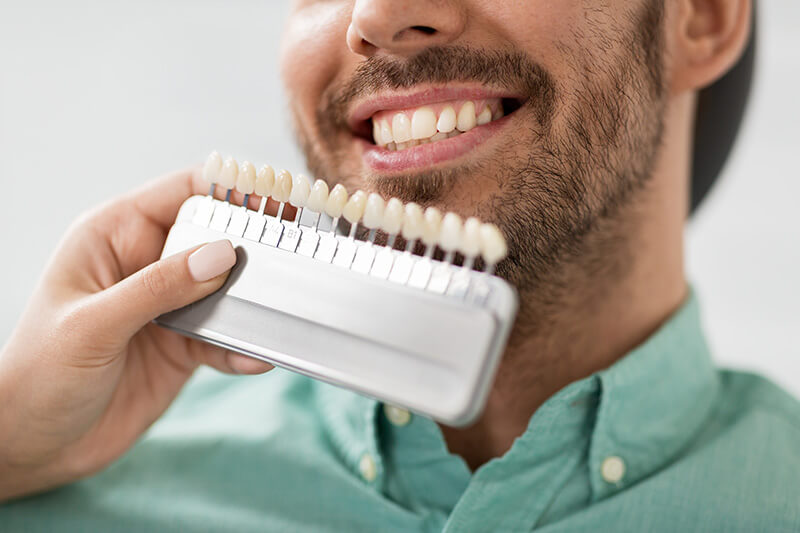What Are Dental Veneers?
If you’re unhappy with the shape, color or spacing of your teeth, dental veneers can make a remarkable difference in your smile — and your self-confidence. Veneers are thin, translucent facings that are applied to your teeth to create a smile that looks attractive and natural. At West Coast Dental, we combine our dental skills and cosmetic artistry to bring about dramatic changes to your teeth, usually in just a couple of office visits.
Who Should Consider Getting Dental Veneers?
You are eligible for veneers as long as the structure of your teeth and roots are intact. Patients with gum disease or cavities must be treated for these conditions before qualifying for veneers.
Tooth Discoloration
Over time, teeth may become stained or discolored from drinking wine, tea or coffee. Enamel erosion can greatly diminish the overall appearance of your teeth. Dental veneers can be used to cover up discolored teeth and create a whiter, brighter smile.
Damaged Teeth
Veneers can also cover teeth that have been chipped, cracked or broken due to decay or trauma. As long as the tooth structure is in place, veneers can be used to hide damaged teeth.
Teeth Displacement
Dental veneers may be a viable alternative to braces for improving the appearance of crooked teeth. Veneers may be used to fix minimal gaps between teeth or slight alignment issues. They may also be helpful if you want to minimize the appearance of a tooth that appears more prominent in your smile. However, if your bite needs to be corrected, braces will likely be required.
Painless Procedure
Unlike crowns, dental veneers require minimal adjustment to your teeth to accommodate the veneer. Typically, the dentist will remove a thin layer of tooth enamel prior to veneer application. Discomfort during veneer preparation is minimal.
Types of Veneers
There are a few types of veneers available depending on your preferred approach. Dental veneers vary in material, preparation required and overall durability.
Traditional Veneers
Traditional dental veneers are typically made of porcelain or composite resin. The porcelain veneer is often chosen for its durability and aesthetic appeal. Porcelain is a more durable material than resin.
No-Prep Veneers
No-prep veneers are less expensive than traditional veneers and do not require your dentist to alter your teeth to prepare for their application. Because they are made of thin laminate, they are less durable than traditional veneers. They also do not hide dental imperfections as well as traditional veneers.
Why Choose Porcelain Veneers?
Porcelain veneers are thin shells of durable, nonporous ceramic material that give your smile a more uniform appearance. Porcelain veneers have a long history of being used in dentistry because of their durability and natural appearance.
Natural Results
Porcelain veneers are designed to look like your natural tooth enamel. In fact, they reflect light in a similar way to your natural teeth. Porcelain veneers can be customized to fit the shade, shape and size of your surrounding teeth.
Customized Treatments
Most patients have different goals and expectations for their smile. Your dentist will work with you to develop a personalized treatment plan that uses porcelain veneers to deliver the exact results you want.
The Veneers Process and Stages
During your initial consultation, your dentist will consider a variety of factors including your face shape, bite and oral health. You and your dentist will discuss your smile goals and any questions you may have. Once your treatment plan is set, the veneers process involves the following stages:
Stage 1: Preparation and Temporary Veneers
To prepare your teeth, your dentist will lightly buff the surface to remove a thin layer of enamel. Then, he or she will take an impression of your teeth which will be used to create your unique set of veneers. Your dentist will put temporary veneers in place to help protect your teeth from hot and cold sensitivity. They also make your teeth appear uniform as you wait for your permanent set.
Stage 2: Permanent Veneers and Cosmetic Adjustments
After removing your temporary veneers, your teeth will be thoroughly cleaned. Then, your permanent veneers will be bonded in place using removable glue. Your dentist will make any final cosmetic adjustments that are needed.
After the Procedure
Take care of your veneers the same way you care for your teeth with regular brushing, flossing and dental visits. Do not brush with abrasive toothpaste. You should also avoid biting your nails or chewing on any hard materials to protect your veneers.
Getting Your Dental Veneers at West Coast Dental
At West Coast Dental, we have the tools, expertise and training needed to give you a beautiful, natural smile using dental veneers.
Team of Board-Certified Specialists
We have board-certified cosmetic dentists nearby ready to serve you. To consult with one of our dentists about how we can help make your smile whiter and brighter, book an appointment today.
Same-Day Appointments
For your convenience, we offer same-day appointments in case you require immediate care. Our dentists will care for your dental veneer needs as quickly and safely as possible.
Insurance and Payment Options
To make it easy to afford dental veneers, we offer flexible payment options. We also accept a wide range of dental insurance programs.




